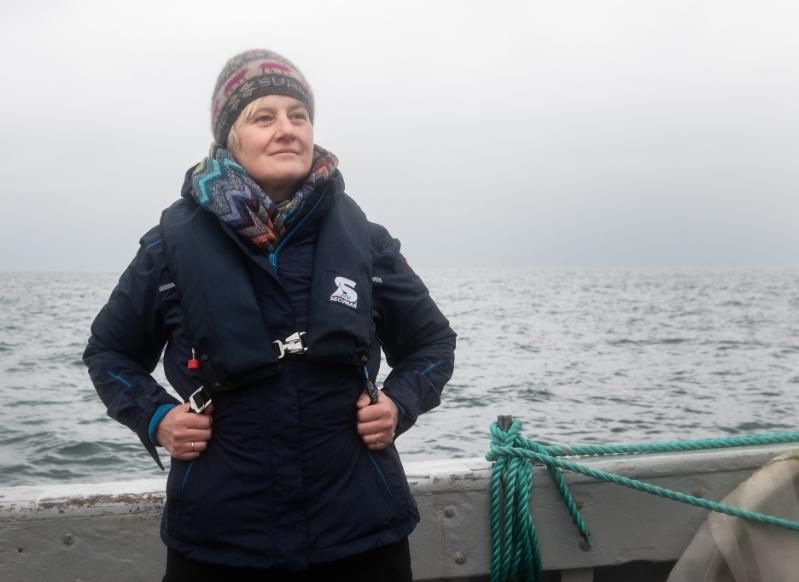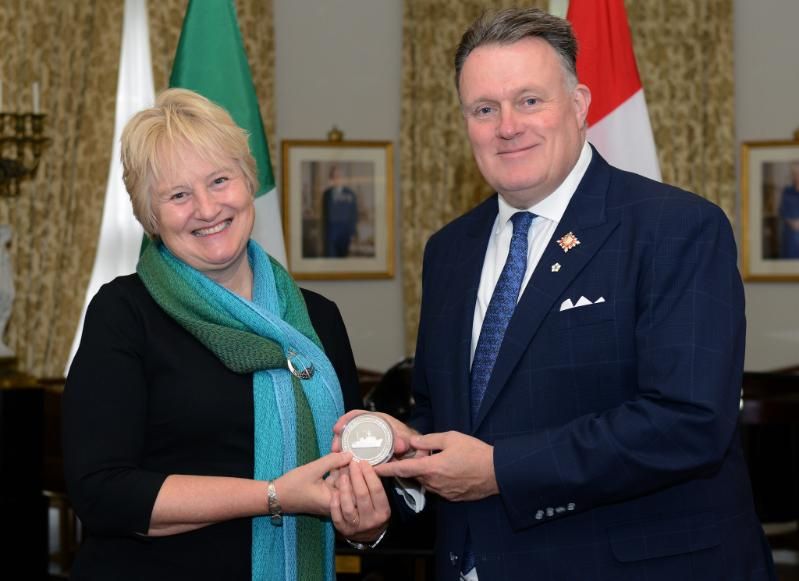Professor Karen Wiltshire wins 2025 A.G. Huntsman Medal
Posted on: 16 October 2025
Prof. Wiltshire, a marine ecologist and climate scientist from Trinity’s School of Natural Sciences, was honoured for her innovative and interdisciplinary research in climate science, and for her significant contribution to international organisations, which has built capacity and brought new voices into the marine sciences.
In Trinity, Prof. Wiltshire leads The Climate Gateway, but she is known internationally for fostering excellence in climate research, education, and innovation by advancing collaborative, science-based solutions to global climate challenges.
Born in Dublin, she studied Environmental Science at Trinity before completing her PhD and Habilitation in Hydrobiology at the University of Hamburg. Over a four-decade career, she has held distinguished research and leadership roles across Europe, including at GKSS Geesthacht, the University of St Andrews, the University of Groningen, the Max Planck Institute of Limnology, Jacobs University Bremen, and the University of Kiel.
Until recently, she was Vice-Director of the Alfred Wegener Institute (AWI) and Director of its Coastal Research. A defining achievement was rescuing the Helgoland Roads Time Series, a unique long-term dataset on marine physical and ecosystem change, which she integrated into global climate databases and models revealing some of the first warming-related changes at the base of the North Sea food web.

Prof. Wiltshire has also shaped international science policy through contributions to UNEP, SCOR-UNESCO, IPCC, and IIASA, and as the first female Chair of POGO. She directed the NIPPON-POGO Centre of Excellence and co-founded SeaNetwork, an ocean science diplomacy initiative to coordinate training programmes across institutions and countries.
She and her team are strong advocates for global capacity building, marine sustainability, and climate resilience.
Prof. Wiltshire said: “The Ocean is our planetary life belt – it is essential for regulating the climate and we humans must realise this and treat it with respect and conscience.”
“I am deeply honoured by this award and wish to thank all who have been the innovative and steadfast wayfarers; believing in the value of long term data sets, the power of international marine education, and in factual science.”
“Every day I meet a member of the public who wants to really understand what’s going on in the oceans and with the climate – as a scientist this is the most positive encouragement one can hope for.”

Prof. Wiltshire receives the A.G. Huntsman Medal.
Prof. Sinéad Ryan, Dean of Research, Trinity, added: “The A.G. Huntsman Medal, presented annually by the Royal Society of Canada, holds international prestige as recipients must have made a long-lasting and continuing impact within the fields of marine and/or climate science. I offer Karen my warmest congratulations on this wonderful recognition, which honours a pioneer oceanographer and biologist. Given her many research achievements, Karen is a very deserving addition to a distinguished list of recipients, who have been recognised for their groundbreaking, far-reaching research."
Prof. Wiltshire accepted her award in Canada yesterday, when she delivered a lecture entitled “In the Fast Lane: Humans, Oceans and Climate.”
In this lecture, she spoke of her journey as a scientist over the past 40 years, focusing on some of the remarkable people, pioneering programmes, transformative research, and breath-taking technology that featured within that period.
She spoke of how in the 1960s, the ocean was cast as a “frontier,” and of today, how it is increasingly recognised as both a critical resource and our greatest ally in buffering climate change. Understanding ocean processes, establishing long-term monitoring, and grasping the scale of socio-ecological systems are prerequisites for building a resilient future in the era of global warming.
She highlighted the people and networks she encountered who have never given up on science, protecting ecosystems, and the importance of training innovative young communities to carry ocean science forward into the future. Many of these stories from small and large expeditions reveal not only data and outcomes but also the human side of marine environmental science.
She also examined our ocean future and considered pathways to resilience grounded in human capacity, community networks, and global cooperation. Ultimately, she invited us to reflect on and chart the course ahead for our oceans, humanity, and the climate.
Media Contact:
Thomas Deane | Media Relations | deaneth@tcd.ie | +353 1 896 4685
